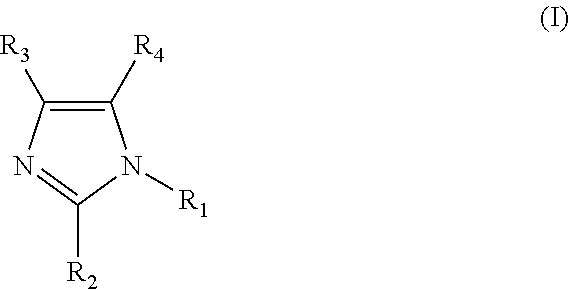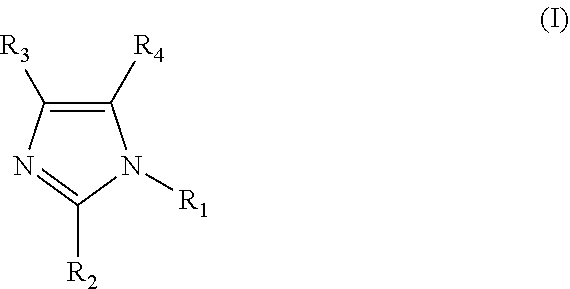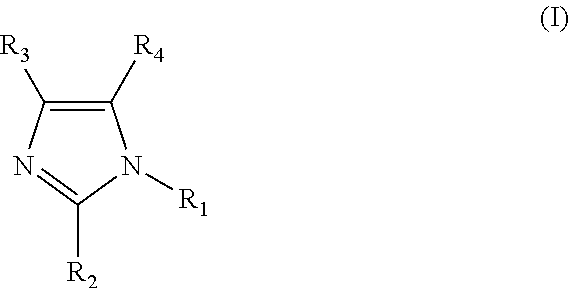Clathrate, curing agent, cure accelerator, epoxy resin composition, and epoxy resin composition for encapsulation of semiconductor
a technology of epoxy resin and encapsulation material, which is applied in the direction of semiconductor/solid-state device details, organic chemistry, solid-state devices, etc., can solve the problems of insufficiently satisfying the composition of encapsulation material, inability to use one-component types, and inability to achieve encapsulation material, etc., to achieve effective cure of resin, suppress curing reaction, and promote storage stability
- Summary
- Abstract
- Description
- Claims
- Application Information
AI Technical Summary
Benefits of technology
Problems solved by technology
Method used
Image
Examples
examples
[0083]Examples will be shown below, but the present invention is not restricted to these Examples in any way.
1) Examples in which an Aliphatic Polyvalent Carboxylic Acid was Used as a Host Compound
Synthesis of Clathrates
Synthesis Method 1
examples 1 to 18
except for Example 11
[0084]Fumaric acid (17.41 g, 150 mmol) and 2-methylimidazole (2MZ 12.32 g, 150 mmol) were mixed in 150 ml of methanol. The mixture was stirred and heated to reflux. Then, the heating was stopped for cooling. The mixture was allowed to cool overnight at room temperature, and then, precipitated crystals were filtered and vacuum-dried. It was confirmed by 1H-NMR, TG-DTA, and XRD that the obtained fumaric acid-2MZ clathrate was a clathrate having an inclusion ratio of 1:1. Examples 3, 4, 5, 9, and 10, and Comparative Example 2-1 were synthesized by a similar method. Example 7 and Comparative Examples 1-1 and 3-1 were synthesized by a similar method, except that ethyl acetate was used instead of methanol. Examples 2, 6, 8, 12, 14, 15, 16, 17, and 18 were synthesized by a similar method, except that acetone was used instead of methanol. In addition, Example 13 was similarly synthesized with a mixed solvent of 100 ml of acetone and 10 ml of methanol.
Synthesis Method 2
example 11
[0085]Adipic acid (21.92 g, 150 mmol) was dispersed in 150 ml of acetone, and a solution of 2E4MZ (16.52 g, 150 mmol) in 75 ml of acetone was dropped. After the completion of the dropping, the mixture was stirred for 3 hours, while being heated to reflux. Then, the mixture was cooled to room temperature, and precipitated crystals were filtered and vacuum-dried. It was confirmed by 1H-NMR, TG-DTA, and XRD that the obtained adipic acid-2E4MZ clathrate was a clathrate having an inclusion ratio of 1:1. Comparative Example 3-1 was similarly synthesized, changing acetone to ethyl acetate. Comparative Example 4-1 was similarly synthesized, changing acetone to methanol.
[Production of Epoxy Resins]
[0086]Using each of the clathrate of Examples 1 to 18 and Comparative Examples 1-1 to 4-1 as a curing catalyst, materials were mixed with a composition shown in Table 1. Then, the mixture was heated and kneaded at 100° C. for 5 minutes, cooled, and then milled to produce an epoxy resin composition ...
PUM
| Property | Measurement | Unit |
|---|---|---|
| Temperature | aaaaa | aaaaa |
| Semiconductor properties | aaaaa | aaaaa |
| Storage stability | aaaaa | aaaaa |
Abstract
Description
Claims
Application Information
 Login to View More
Login to View More - R&D
- Intellectual Property
- Life Sciences
- Materials
- Tech Scout
- Unparalleled Data Quality
- Higher Quality Content
- 60% Fewer Hallucinations
Browse by: Latest US Patents, China's latest patents, Technical Efficacy Thesaurus, Application Domain, Technology Topic, Popular Technical Reports.
© 2025 PatSnap. All rights reserved.Legal|Privacy policy|Modern Slavery Act Transparency Statement|Sitemap|About US| Contact US: help@patsnap.com



